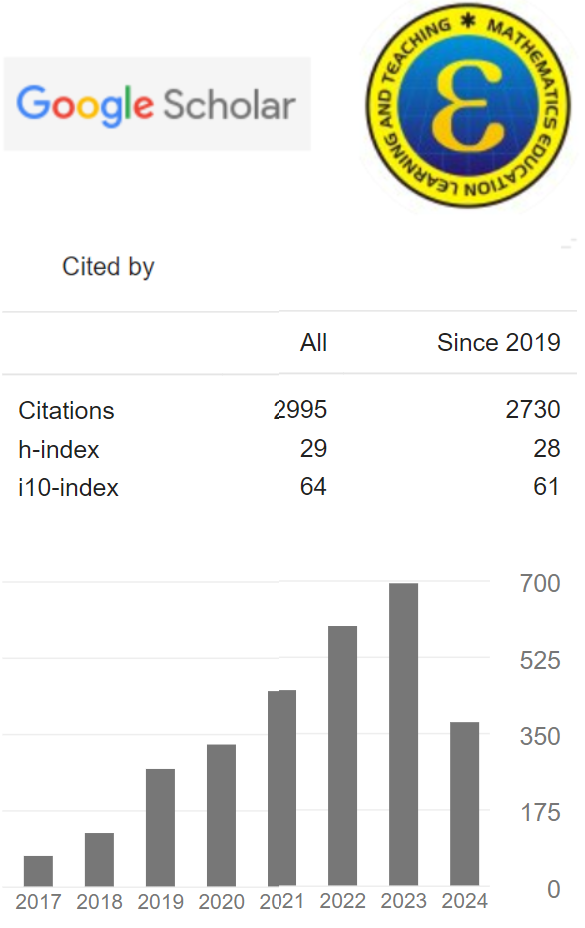Instrumental Student Cognitive Conflict in Solving Mathematical Problems
(1) Bengkulu University
(2) University of Education Indonesia
(*) Corresponding Author
Abstract
Keywords
Full Text:
PDFReferences
Baser, M. (2006). Fostering Conceptual Change by Cognitive Conflict Based Instruction on Students’ Understanding of Heat and Temperature Concepts. Eurasia Journal of Mathematics, Science and Technology Education, 2(2), 96–114. https://doi.org/10.12973/ejmste/75458
BSNP. (2006). Standar Isi untuk Satuan Pendidikan Dasar dan Menengah Standar Kompetensi dan Kompetensi dasar SMA/MA. Jakarta: BSNP
Dahlan, J. A., Rohayati, A., & Karso, K. (2012). Implementasi strategi pembelajaran konflik kognitif dalam upaya meningkatkan High Order Mathematical Thinking Siswa. Jurnal Pendidikan, 13(2), 65-76. https://doi.org/10.33830/jp.v13i2.372.2012
Devine, A., Hill, F., Carey, E., & Szűcs, D. (2018). Cognitive and emotional math problems largely dissociate: Prevalence of developmental dyscalculia and mathematics anxiety. Journal of Educational Psychology, 110(3), 431-444. https://doi.org/10.1037/edu0000222
Glaser, B. G. (1965). The constant comparative method of qualitative analysis. Social problems, 12(4), 436-445. https://doi.org/10.2307/798843
Hendriana & Soemarmo. (2014). Penilaian Pembelajaran Matematika. Bandung: PT Refika Aditama.
Ibda, F. (2015). Perkembangan Kognitif: Teori Jean Piaget. INTELEKTUALITA, 3(1), 27-38. https://jurnal.ar-raniry.ac.id/index.php/intel/article/view/197
Kang, H., Scharmann, L. C., Kang, S., & Noh, T. (2010). Cognitive Conflict and Situational Interest as Factors Influencing Conceptual Change. International Journal of Environmental and Science Education, 5(4), 383–405. https://digitalcommons.unl.edu/teachlearnfacpub/379/
Khiyarusoleh, U. (2016). Konsep Dasar Perkembangan Kognitif Pada Anak Menurut Jean Piaget. Jurnal Dialektika Jurusan PGSD, 5(1), 1-10. http://journal.peradaban.ac.id/index.php/jdpgsd/article/view/17
Kwon, J., Park, H., Kim, J., Lee, Y. J., & Lee. G. (2003). What Do We Know About Students' Cognitive Conflict in Science Classroom: A Theoretical Model Of Cognitive Conflict Process. Research Report on Subject EducationRR98-VI-11, Ministry of Education in Korea. https://eric.ed.gov/?id=ED472903
Lee, G., & Byun, T. (2012). An Explanation for the Difficulty of Leading Conceptual Change Using a Counterintuitive Demonstration: The Relationship Between Cognitive Conflict and Responses. Research in Science Education, 42(5), 943–965. https://doi.org/10.1007/s11165-011-9234-5
Lestary, R., Subanji, & Rahardi, R. (2018). Konflik Kognitif Internal Siswa dalam Menyelesaikan Masalah Matematika Ditinjau dari Proses Asimilasi Akomodasi. Numerical: Jurnal Matematika dan Pendidikan Matematika, 2(2), 167-178. https://doi.org/10.25217/numerical.v2i2.329
Maume, K., Mathews, P. (2000). A study of cognitive accelerated learning in science. Irish Educational Studies, 19(1), 95-106. https://doi.org/10.1080/0332331000190110
Mufit, F., Festiyed, F., Fauzan, A., & Lufri, L. (2018). Impact of learning model based on cognitive conflict toward student’s concepttual understanding. Conference Series: Materials Science and Engineering, 335(1). https://doi.org/10.1088/1757- 899X/335/1/012072
Netti, S., Nusantara, T., Subanji, Abadyo, & Anwar, L. (2016). The Failure to Construct Proof Based on Assimilation and Accommodation Framework from Piaget. International Education Studies, 9(12), 12. https://doi.org/10.5539/ies.v9n12p12
Piaget, J. (1932). The moral judgment of the child. London: Free Press
Saldana, J. (2011). Fundamentals of Qualitative Research. Oxford University Press
Shahbari, J.A., & Peled, I. (2015). Resolving Cognitive Conflict in a Realistic Situation with Modeling Charateristics: Coping With a Changing Reference in Fractions. International Journal of Science and Mathematics Education, 13(4), 891–907. https://doi.org/10.1007/s10763-014-9509-1
Skemp, R. R. (1976). Relational Understanding and Instrumental Understanding. Mathematics Teaching, 77(1), 20–26.
Slavin, R.E. (2006). Education Psychology Theory and Practice Eighth Edition. United State of America: Johns Hopkins University.
Sudaryono. (2012). Dasar-dasar Evaluasi Pembelajaran. Yogyakarta. Graha Ilmu.
Sudijono, A. (2009). Pengantar Evaluasi Pendidikan. Jakarta: PT. Raja Grafindo Persada
Sukoriyanto, J., Nusantara, T., Subanji, Chandra, T.D. (2016). Students Thinking Process in Solving Combination Problems Considered from Assimilation and Accommodation Framework. Educational Research and Reviews, 11(16), 1494–1499. https://doi.org/10.5897/err2016.2811
Wyrasti, A. F. (2016). Penelusuran Konflik Kognitif Siswa dalam Menyelesaikan Masalah Matematika. In Prosiding Seminar Nasional Pendidik dan Pengembang Pendidikan Indonesia yang Diselenggarakan oleh APPPI, Dinas Pendidikan Kota Batu, dan PGRI Kota Batu pada (Vol. 21, p. 73â).
Wyrasti, A. F., Sa’dijah, C., & Anwar, L. (2016). The assessment of students’ cognitive conflict by using student’s cognitive map in solving mathematics problem. In International Conference on Education (ICE2) 2018: Education and Innovation in Science in the Digital Era (pp. 72-82). https://pasca.um.ac.id/conferences/index.php/ice/article/view/15
Zazkis, R., & Chernoff, E. J. (2008). What makes a counterexample exemplary?. Educational Studies in Mathematics, 68(3), 195-208. https://doi.org/10.1007/s10649-007-9110-4
DOI: 10.24235/eduma.v11i2.11468
Article Metrics
Abstract view : 11 timesPDF - 3 times
Refbacks
- There are currently no refbacks.
Copyright (c) 2022 Eduma : Mathematics Education Learning and Teaching


.png)










